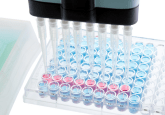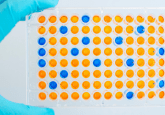Magneto-nanosensor biochips: a novel protein immunoassay platform

In a recent paper published in Scientific Reports, researchers investigated the use of a magneto-nanosensor platform to detect protein biomarkers. They demonstrated the utility of this technique by measuring protein biomarkers in an in vivo mouse radiation model.
There are a number of detection methods and platforms for radiation biodosimetry, including ELISA and electrochemical sensors. There is, however, still a need for continued research and development in this area as the existing techniques are limited in terms of their sensitivity and scalability, for example.
Over 200 proteins have now been identified as biomarkers of radiation exposure. The team developed a biochip capable of detecting two of these biomarkers in small amounts of peripheral blood. The chip consists of 64 magneto-nanosensors and uses arrays of giant magnetoresistance spin-valves to indicate the concentrations of proteins.
An in vivo mouse radiation model was used to test the technique following exposure to different levels of radiation. Dose dependent and temporal upregulation of the biomarkers Flt3 ligand (Flt3lg) and serum amyloid A1 (Saa1) were studied. Flt3lg concentrations demonstrated excellent dose discrimination up to a week after exposure, however, the Saa1 dose response was found to be shorter, at up to 2 days after exposure. ELISA experiments were performed to verify the magneto-nanosensor measurements and the results were significantly correlated.
The findings suggest that the magneto-nanosensor immunoassay holds a number of advantages for radiation biodosimetry, including its low-dose sensitivity, small blood volume requirements and speed, as well as its dose and time responses. The technique could lead to rapid identification of patients with radiation exposure who require immediate care. In addition to this, the authors of the article conclude, “since our platform is applicable for all protein biomarkers, we believe that the magneto-nanosensor biochips hold great potentials for medical diagnosis and clinical research, including but not limited to radiation biomarker validation and early radiation triage.”
Sources: Kim D, Marchetti F, Chen Z et al. Nanosensor dosimetry of mouse blood proteins after exposure to ionizing radiation. Sci Rep. 3, 2234 (2013); New biochip holds great promise for quickly triaging people after radiation exposure.





